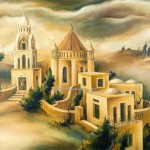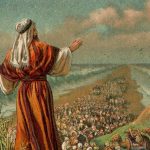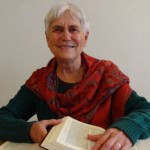
20th Sunday of Ordinary Time (commentary).
Sr. Anne-Catherine AVRIL, NDS
We are in the time of King Sedecias, before the exile, which means before 587 ad.
The Prophet Jeremiah is like all the prophets, not someone who predicts the future, but a person totally immersed in the world of God and totally present to the actuality of what his people is living. It is why he can be attuned to the vision of God on humankind and help the people to read God in its history. He challenges when necessary and contorts when it is the good time to comfort. Jeremiah is thrown into the cistern because (I am quoting): this man should be put to death because he is discouraging the people by speaking such words to them. Sometimes ago the daily liturgy was offering another passage when Jeremiah was challenging the false prophet Hananiah( I quote): Listen well Hananiah, the Lord has not sent you and you made this people trust in a lie.
Thanks to Eved melek (meaning “the servant of the King) who convinced the king, Jeremiah was taken out of the cistern.
In the Gospel we see Jesus acting or speaking in the same way. He did not come to bring an easy peace which would bear fruit in a false unity. The truth that he proclaims causes divisions between those who accept it and those who refuse it. Jesus has come to set a fire on earth, the fire which purifies ,discerns and judges. Already John the Baptist was announcing the one “ who will baptize you in fire and Spirit.
Baptism itself is meaningful: going down , being immersed in water like in death, and getting out, purified passing from death to life. This is the paschal mystery. And Jesus is in distress ( or “stress”this is the meaning of the greek) until it is completed> The greek word “teleo” expresses the final accomplishment, perfect, eschatological. The paschal mystery of Christ accomplished in his person, is aiming to its final fulfilment in humankind.
The second reading of the Hebrews is an invitation to join the crowd of witnesses who preferred to be despised than to renounce to truth.Thus they built a true peace fruit of trial. They were fixing their eyes on Jesus the origin and end ( again a word expressing the eschatological end: teleio)
The psalm helps us to pray with this same movement of going down and up, mentioned in the first reading: He drew me up from the desolated pit out of the miry bog. He set my feet upon the rock making my steps secure.
Let us conclude with remembering that the Jews today commemorate the destruction of the first and second temple. Memory which reminds them (and us) that the sin, above hate and all the lack of mutual love, is breaking the world. And we have now to mend the world, in order to hasten the redemption and restore the fullness of the presence of God in the world.






